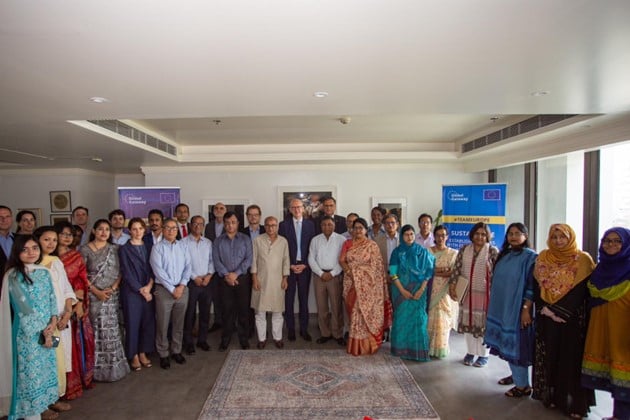
The government of Bangladesh and potential investors into energy storage in the South Asian country were handed a European Union-funded roadmap for the technology’s development last week.
The European Union (EU) delegation to Bangladesh handed over its Energy Storage Roadmap for the country at an official event at the residence of the EU ambassador on 1 June. It was attended by various dignitaries and government officials as well as government power sector stakeholders, transmission and distribution utilities and representatives of various donors such as the World Bank and Asian Development Bank.
Considering three different future scenarios, the roadmap highlights specific use cases for energy storage that could be effective and beneficial for the Bangladeshi power sector.
For example, the study found a single 300MW/400MWh battery energy storage system (BESS) in the region of Mymensingh, a city in north-central Bangladesh could reduce load management costs by US$200,000 per day or US$71.3 million a year. The region’s average load shed is increasing, with 60MW of load shedding over three hours in April 2021 becoming 175MW over five hours by April 2022.
Try Premium for just $1
- Full premium access for the first month at only $1
- Converts to an annual rate after 30 days unless cancelled
- Cancel anytime during the trial period
Premium Benefits
- Expert industry analysis and interviews
- Digital access to PV Tech Power journal
- Exclusive event discounts
Or get the full Premium subscription right away
Or continue reading this article for free
It also suggests various policy and regulatory actions and interventions that could help unlock investment, enabling the deployment of energy storage. In addition, a roundtable discussion hosted at the event brought various stakeholders together to talk about possible courses of action, the EU delegation said in a release sent to media including Energy-Storage.news.
What’s in the roadmap
The study was funded through the EU’s Global Technical Assistance Facility (TAF) for Sustainable Energy. The TAF’s overall aim is to increase the share of energy generated within Bangladesh from renewable energy, and integrating that energy into its electricity networks, while at the same time helping to establish security of electricity supply and stability of the grid.
Along with the use case above around load management, the study also looked at energy storage co-located or in hybridised combination with renewable energy facilities, as well as stationary batteries paired with electric vehicle (EV) infrastructure.
It found that standalone BESS for load management and in combination with variable renewable energy generation (VRE) would have an economic internal rate of return (EIRR) of around 30% each i.e., the amount of investment back into the economy they would drive, while for EV charging infrastructure it would be around 23%.
Load management would have the highest payback in terms of financial internal rate of returns (FIRR), at 12%, on a US$350 million investment into the 300MW system. For co-location with VRE, the FIRR was 3.24%, and slightly higher at 4.63% for the EV use case.
The reason for the much greater economic case for load management is the cost of about US$88 million a year’s worth of heavy fuel oil (HFO) for peaking plants which would be displaced.
The EU study identified the short-term potential and economic value of energy storage, with a total estimated potential for 7.3GWh of deployments in Bangladesh: about 250MW/500MWh of which could be paired directly with VRE, 1GW/2GWh for grid applications including load management, peak shaving and replacement of thermal peaker plants, and anywhere between 1.2GW/4.8GWh and 3GW/12GWh of stationary energy storage for EV infrastructure.
While deploying that 7.3GWh would require more than US$1 billion investment, the multiplier of economic benefit back to the country would be fivefold, the study claimed.
“This event has not only highlighted the strategic importance of energy storage in Bangladesh’s sustainable energy goals but has also laid the foundation for collaboration and investments in this crucial sector,” EU ambassador to Bangladesh Charles Whiteley said at the event last week.
A study on potential for energy storage deployment across South Asia published in 2021 by the US National Renewable Energy Laboratory (NREL), found that while India was the standout leader, other countries in the region including Bangladesh held “significant opportunities” for storage.
Energy-Storage.news’ publisher Solar Media will host the 1st Energy Storage Summit Asia, 11-12 July 2023 in Singapore. The event will help give clarity on this nascent, yet quickly growing market, bringing together a community of credible independent generators, policymakers, banks, funds, off-takers and technology providers. For more information, go to the website.





